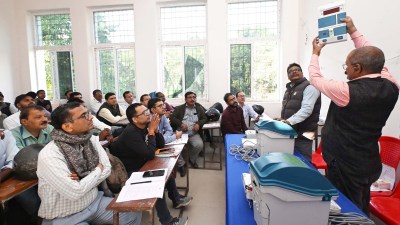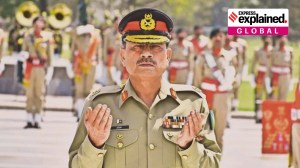Quietly, the Malayalee takes over
Why did the Malayalee cross the road? To join the UPA, he thought it was a trade union. As the first anniversary celebrations of the UPA gov...

Why did the Malayalee cross the road? To join the UPA, he thought it was a trade union. As the first anniversary celebrations of the UPA government fade out, there is still quiet jubilation in a little corner—to exult in the arrival of the Malayalee in Power Delhi.
For the ‘Mundu Mafia’, as they are uncharitably called, has stealthily and silently come to win the confidence and trust of the two most important people in government—Prime Minister Manmohan Singh and Congress president and UPA chairperson, Sonia Gandhi.
The roll call is a veritable who’s who in power—in the PMO, it is the Numero Uno, National Security Advisor (NSA) M K Narayanan, a former Intelligence Bureau chief. Initially, while Narayanan looked after the commanding internal security, it was a fellow-Malayalee, the late J N (Mani) Dixit, former foreign secretary, who was the NSA, until he passed away this January. Narayanan simply moved into the job later.
Then there is T K A Nair, principal secretary to the PM, a post which had assumed intoxicating power when Brajesh Mishra occupied the post during A B Vajpayee’s time. Nair, a former Punjab cadre IAS officer, was handpicked by Dr Singh when they served together in the bureaucracy.
The present bureaucratic hierarchy is equally tantalising for the Malayalee:
• The present RAW (our CIA) chief Hormis Tharakan is a Kerala cadre IPS officer—he was pulled out from the state where he was DGP
• The Secretary to President A P J Abdul Kalam is Madhavan Nair—he was former Secretary, Defence Production
• The Commerce Ministry seems to be bristling with key Malayalee bureaucrats despite Kerala’s dismal reputation for trade: S N Menon, Commerce Secretary; K T Chacko, DG for Foreign trade; G K Pillai, Additional Secretary, who now heads the Free Trade Area Cell in the Ministry; Christy Fernandes, Additional Secretary, Anti-Dumping Cell.
• Culture is dominated by Babu Rajeev, DG, Archaeological Survey of India; Dr Sudha Gopalkrishnan, Mission Head, National Manuscripts Mission at the IGNCA.
Then there’s V George, former steno-turned-private secretary to Sonia Gandhi, who invented the phantasmal ‘‘source at 10, Janpath’’, and P P Madhavan, OSD to Gandhi and now close aide to her son, Rahul.
Yet, with all the accompanying eminence for the Malaylee’s unwavering sincerity, efficiency, devotion and hard work, there is no visible Malayalee caucus or coterie which has come to dominate Delhi. In fact, the Malayalee mutant is still invisible, unlike the Tamil Brahmin, Bengali or Allahabad Brahmin.
While the Malayalee Majesties are low-key, the Malayalee majority are quite happy being faceless clerks, forever preferring to file papers in countless rooms in endless corridors.
‘‘The Malayalee is instinctly skeptical and cynical about power and institutions of power,’’ says lauded Malayalee poet K Sachidanandan, Secretary, Sahitya Akademi. ‘‘And joining the establishment is an act of betrayal of the revolution. Because of his in-built sense of freedom and radicalism, he views power as bourgeoisie, shameful and pro-establishment,’’ he says.
However, the ‘bourgeoisie’ Malayalee is seen as unhelpful and distant, and can never be accused of packing his ministry or department with fellow-Malayalees.
‘‘The Malayalee has an intrinsic moral fear of tarnishing his reputation,’’ says Prof N N Pillai, principal, post-graduate college, Bhartiya Vidya Bhavan. ‘‘So he refuses to oblige even a small favour. He has come a long way from home, and has a lot at stake. Whether the fear of helping his community is good or not is debatable,’’ he says.
Perhaps it is celebrated Malayam author M Mukundan—now ready to launch his new book—who explains the peculiar ‘‘Malaylee anxiety syndrome’’.
Says Mukundan, ‘‘Tension and anxiety is in-built in a Malayalee. When two Malayalees meet for a drink at the India International Centre (IIC) bar, there is no joking and laughter like the Punjabis, instead they worry about a range of issues, from the effects of globalisation to global warming. This is because their education has instilled in them a strong sense of social justice and compassion. For the common Malayalee, this overriding guilt has made him impractical and unambitious.’’



- 01
- 02
- 03
- 04
- 05



























